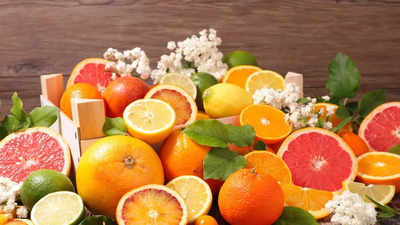Trending
6 Winter fruits to boost antioxidant levels
As winter approaches, health experts recommend incorporating nutrient-rich fruits into your diet to bolster your immune system and overall health. Citrus fruits, pomegranates, apples, pears, kiwis, and cranberries are packed with vitamins, minerals, and antioxidants that combat oxidative stress, reduce inflammation, and support healthy skin. These fruits offer a delicious and effective way to stay healthy throughout the colder months.

Citrus Fruits
Citrus fruits are synonymous with winter and offer a potent dose of vitamin C, a powerful antioxidant known for its ability to support the immune system and promote healthy skin. Vitamin C helps fight off colds and flu by stimulating the production of white blood cells and antibodies. It also plays a crucial role in collagen synthesis, promoting firm, youthful skin. In addition to vitamin C, citrus fruits contain flavonoids, like hesperidin and naringenin, which have anti-inflammatory properties that support heart health and reduce oxidative stress.

Fruits are rich in essential nutrients that support health. They are high in vitamins like Vitamin C, vital for immunity and skin health, and Vitamin A, crucial for vision and growth. Many fruits are abundant in dietary fiber, which aids digestion and supports heart health. Potassium, found in bananas and citrus fruits, regulates blood pressure, while antioxidants like flavonoids in berries protect cells from damage. Fruits also contain folate, important for DNA synthesis and cell division, especially in pregnant women. Low in fat and calories, fruits provide natural sugars for energy, making them a nutritious addition to any diet.
Pomegranates are among the most antioxidant-rich fruits you can find. Packed with punicalagins and anthocyanins, these antioxidants help fight oxidative stress and reduce inflammation in the body. Pomegranates are particularly beneficial for heart health, as they have been shown to lower blood pressure and reduce cholesterol levels. The seeds, or arils, are also a rich source of vitamin C and vitamin K, both of which are essential for immune function and blood circulation.
Apples
Apples are a winter fruit that provides a rich source of polyphenols and flavonoids, antioxidants that help fight inflammation, promote heart health, and protect the skin from aging. Apples also contain vitamin C, which supports immunity and promotes collagen formation, keeping your skin smooth and glowing. The fiber found in apples aids digestion and helps regulate blood sugar, contributing to overall well-being.

Pears
Pears are another delicious winter fruit that are packed with antioxidants like vitamin C, flavonoids, and polyphenols. These antioxidants help reduce oxidative stress, protect the body from chronic diseases, and promote healthy skin. Pears also contain a good amount of fiber, which supports digestive health and can help regulate cholesterol levels. The antioxidants in pears also have anti-inflammatory properties, making them an excellent choice for reducing overall body inflammation.
Kiwis
Kiwis are one of the most nutrient-dense fruits, especially during the winter months. They are an excellent source of vitamin C, which supports the immune system and helps fight off colds. Kiwis are also high in vitamin E, another powerful antioxidant that helps protect skin cells from oxidative damage. In fact, kiwis contain beta-carotene, which is converted into vitamin A in the body and supports healthy skin and vision.
Cranberries
Cranberries are well-known for their ability to prevent urinary tract infections (UTIs), but they are also packed with antioxidants like proanthocyanidins, which help fight oxidative stress and support heart health. Cranberries are rich in vitamin C and vitamin E, both of which boost immune function and protect the skin. These berries also contain fiber, which aids in digestion and helps regulate blood sugar levels.
End of Article
FOLLOW US ON SOCIAL MEDIA









